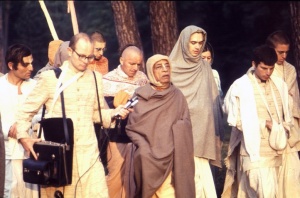BG 3.23: Difference between revisions
m (1 revision(s)) |
(Vanibot #0054 edit - transform synonyms into clickable links, which search similar occurrences) |
||
| (One intermediate revision by one other user not shown) | |||
| Line 1: | Line 1: | ||
{{ | [[Category:Bhagavad-gita As It Is (1983+) - Chapter 03]] | ||
<div style="float:left">'''[[Bhagavad-gita As It Is (1983+)]] - [[BG 3 (1983+)|Chapter 3: Karma-yoga]]'''</div> | |||
<div style="float:right">[[File:Go-previous.png|link=BG 3.22]] '''[[BG 3.22]] - [[BG 3.24]]''' [[File:Go-next.png|link=BG 3.24]]</div> | |||
{{CompareVersions|BG|3.23|BG 1972|BG 1983+}} | |||
{{RandomImage}} | |||
==== TEXT 23 ==== | ==== TEXT 23 ==== | ||
<div class="devanagari"> | |||
:यदि ह्यहं न वर्तेयं जातु कर्मण्यतन्द्रितः । | |||
:मम वर्त्मानुवर्तन्ते मनुष्याः पार्थ सर्वशः ॥२३॥ | |||
</div> | |||
<div | <div class="verse"> | ||
:yadi hy ahaṁ na varteyaṁ | |||
:jātu karmaṇy atandritaḥ | |||
:mama vartmānuvartante | |||
:manuṣyāḥ pārtha sarvaśaḥ | |||
</div> | </div> | ||
==== SYNONYMS ==== | ==== SYNONYMS ==== | ||
<div class="synonyms"> | |||
<div | ''[//vanipedia.org/wiki/Special:VaniSearch?s=yadi&tab=syno_o&ds=1 yadi]'' — if; ''[//vanipedia.org/wiki/Special:VaniSearch?s=hi&tab=syno_o&ds=1 hi]'' — certainly; ''[//vanipedia.org/wiki/Special:VaniSearch?s=aham&tab=syno_o&ds=1 aham]'' — I; ''[//vanipedia.org/wiki/Special:VaniSearch?s=na&tab=syno_o&ds=1 na]'' — do not; ''[//vanipedia.org/wiki/Special:VaniSearch?s=varteyam&tab=syno_o&ds=1 varteyam]'' — thus engage; ''[//vanipedia.org/wiki/Special:VaniSearch?s=jātu&tab=syno_o&ds=1 jātu]'' — ever; ''[//vanipedia.org/wiki/Special:VaniSearch?s=karmaṇi&tab=syno_o&ds=1 karmaṇi]'' — in the performance of prescribed duties; ''[//vanipedia.org/wiki/Special:VaniSearch?s=atandritaḥ&tab=syno_o&ds=1 atandritaḥ]'' — with great care; ''[//vanipedia.org/wiki/Special:VaniSearch?s=mama&tab=syno_o&ds=1 mama]'' — My; ''[//vanipedia.org/wiki/Special:VaniSearch?s=vartma&tab=syno_o&ds=1 vartma]'' — path; ''[//vanipedia.org/wiki/Special:VaniSearch?s=anuvartante&tab=syno_o&ds=1 anuvartante]'' — would follow; ''[//vanipedia.org/wiki/Special:VaniSearch?s=manuṣyāḥ&tab=syno_o&ds=1 manuṣyāḥ]'' — all men; ''[//vanipedia.org/wiki/Special:VaniSearch?s=pārtha&tab=syno_o&ds=1 pārtha]'' — O son of Pṛthā; ''[//vanipedia.org/wiki/Special:VaniSearch?s=sarvaśaḥ&tab=syno_o&ds=1 sarvaśaḥ]'' — in all respects. | ||
</div> | </div> | ||
==== TRANSLATION ==== | ==== TRANSLATION ==== | ||
<div class="translation"> | |||
<div | |||
For if I ever failed to engage in carefully performing prescribed duties, O Pārtha, certainly all men would follow My path. | For if I ever failed to engage in carefully performing prescribed duties, O Pārtha, certainly all men would follow My path. | ||
</div> | </div> | ||
==== PURPORT ==== | |||
= | <div class="purport"> | ||
In order to keep the balance of social tranquillity for progress in spiritual life, there are traditional family usages meant for every civilized man. Although such rules and regulations are for the conditioned souls and not Lord Kṛṣṇa, because He descended to establish the principles of religion He followed the prescribed rules. Otherwise, common men would follow in His footsteps, because He is the greatest authority. From the ''Śrīmad-Bhāgavatam'' it is understood that Lord Kṛṣṇa was performing all the religious duties at home and out of home, as required of a householder. | |||
</div> | |||
<div | <div style="float:right; clear:both;">[[File:Go-previous.png|link=BG 3.22]] '''[[BG 3.22]] - [[BG 3.24]]''' [[File:Go-next.png|link=BG 3.24]]</div> | ||
__NOTOC__ | |||
</div> | __NOEDITSECTION__ | ||
__NOTOC__ | |||
Latest revision as of 15:27, 17 February 2024

A.C. Bhaktivedanta Swami Prabhupada
TEXT 23
- यदि ह्यहं न वर्तेयं जातु कर्मण्यतन्द्रितः ।
- मम वर्त्मानुवर्तन्ते मनुष्याः पार्थ सर्वशः ॥२३॥
- yadi hy ahaṁ na varteyaṁ
- jātu karmaṇy atandritaḥ
- mama vartmānuvartante
- manuṣyāḥ pārtha sarvaśaḥ
SYNONYMS
yadi — if; hi — certainly; aham — I; na — do not; varteyam — thus engage; jātu — ever; karmaṇi — in the performance of prescribed duties; atandritaḥ — with great care; mama — My; vartma — path; anuvartante — would follow; manuṣyāḥ — all men; pārtha — O son of Pṛthā; sarvaśaḥ — in all respects.
TRANSLATION
For if I ever failed to engage in carefully performing prescribed duties, O Pārtha, certainly all men would follow My path.
PURPORT
In order to keep the balance of social tranquillity for progress in spiritual life, there are traditional family usages meant for every civilized man. Although such rules and regulations are for the conditioned souls and not Lord Kṛṣṇa, because He descended to establish the principles of religion He followed the prescribed rules. Otherwise, common men would follow in His footsteps, because He is the greatest authority. From the Śrīmad-Bhāgavatam it is understood that Lord Kṛṣṇa was performing all the religious duties at home and out of home, as required of a householder.